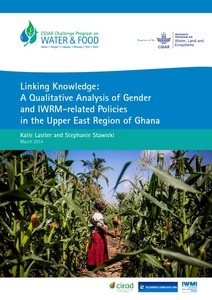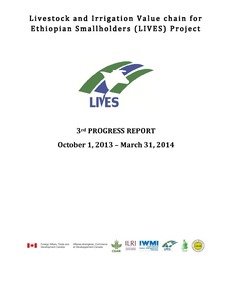NBDC key message: Empower local communities and develop their leadership capacities
NBDC key message: Improve markets, value chains and multi-stakeholder processes
This digital story was produced to communicate the key messages resulting from the Nile Basin Development Challenge (NBDC). Key message 8 is to improve markets, value chains and multi-stakeholder institutions to enhance the benefits and sustainability of rainwater management investments. The Nile BDC aimed to improve the livelihoods of farmers in the Ethiopian highlands through land and water management and was funded by the Challenge Program for Water and Food.
NBDC key message: Integrate multiple interventions at watershed and basin scales
NBDC key message: Strengthen and transform institiutional and human capacities
This digital story was produced to communicate the key messages resulting from the Nile Basin Development Challenge (NBDC). Key message 3 is to strengthen and transform institutional and human capacities among all stakeholders to achieve the potential benefits of sustainable land management. The Nile BDC aimed to improve the livelihoods of farmers in the Ethiopian highlands through land and water management and was funded by the Challenge Program for Water and Food.
Romania : Integrated Water Resources Rapid Assessment
The purpose of this report is to assess
the climate change impacts on water resources in Romania
from an integrated, multi-sectoral perspective, and to
recommend priority actions for addressing the identified
risks and opportunities. The analysis is presented from an
integrated water resources perspective, thereby including
all pertinent water-related sectors, viz. municipal water
supply and sanitation, industrial water supply, agriculture,
Kyrgyz Republic : Overview of Climate Change Activities
This overview of climate change
activities in the Kyrgyz Republic is part of a series of
country notes for five Central Asian countries that
summarize climate portfolio in a number of sectors, namely
agriculture, forestry, water, health, energy, and transport.
Recognizing the nature and significance of climate change
contribution to an increase in disaster risk, the note also
looks into the development partners' approaches and
Enhancing Food Security in Afghanistan : Private Markets and Public Policy Options
This report analyzes some key aspects of
food security, namely production, trade, markets and food
aid at the national level, and consumption at the household
level. In doing so it aspires to make a contribution to the
on-going work in Afghanistan regarding the attainment of the
poverty and hunger Millennium Development Goal. The major
findings of the report can be summarized as follows: Food
security (at the national level) does not necessarily
Linking Knowledge: A Qualitative Analysis of Gender and IWRM-related Policies in the Upper East Region of Ghana
While this study was originally conducted to gather baseline data on the general activities, issues, and concerns of women in the Upper East Region in northern Ghana, the initial data collection led to the discovery that women in the Upper East Region are organized, either by their own accord or through the recommendation of local governing bodies, in social groupings that fulfill specific needs such as access to credit, access to agricultural inputs, and access to reciprocal labor and support.
LIVES third progress report October 1, 2013–March 31, 2014
Development of the mobile geographic information system for investigation of farm land and irrigation/ drainage facilities
Facilitating Collective and Inclusive Decision Making on Integrated Water Resources Management in Burkina Faso
In Burkina Faso, more than two-thirds of the population relies on rain-fed agriculture for food and income. However, scarce and insufficient water or irregular rainfall frequently puts farmers at risk of losing their crops. Climate change is making already variable rainfall less reliable. Yet all kinds of water users—farmers, fishers, livestock herders, domestic users, city dwellers, emerging industries–and ecosystems depend on access to water of the right quality, in the right quantity, and at the right time.







